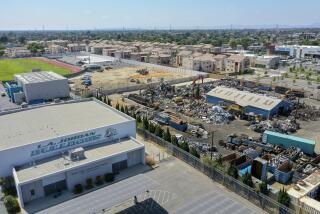Toxics Fine Leads to Gains in Technology
- Share via
A Terminal Island scrap-metal firm has paid a record $145,500 in fines and restitution for illegally storing hazardous waste and has spent an additional $3 million to develop a system to make its wastes harmless.
City officials say the system developed by Hugo Neu-Proler Co. and the University of California, Berkeley, could help other scrap-metal processors solve waste problems.
“This case marks the first time the California Hazardous Waste Control Act has resulted in the creation of a new technology to solve a hazardous-waste problem instead of just punishing the people and the companies that create the problem,” said Deputy City Atty. Steven R. Tekosky.
Charged a Year Ago
Neu-Proler, which processes scrap metal for resale overseas, was charged one year ago with storing 32,000 tons of material containing hazardous levels of lead and other toxic materials for more than the 90 days allowed under the state’s waste-control law.
Neu-Proler pleaded no contest to the charges and agreed to pay the fine, which included restitution totaling $35,000 to the Los Angeles Fire Department and $80,000 to the state Department of Health Services for investigation costs.
The firm, which shreds automobiles and other objects to extract recyclable metals, also creates an unsalvageable byproduct that contains lead dust and other hazardous materials.
Under the law, the so-called “duff” must be shipped to a hazardous-waste disposal site within three months after it is created.
Hard to Find Sites
Neu-Proler and several other scrap-metal firms, however, have had a difficult time finding disposal sites in California that will accept the toxic duff, said Tekosky, who heads the city attorney’s environmental unit.
To bring the Terminal Island site into compliance with state law, Neu-Proler officials since last August have shipped the old waste to a dumping site in Arizona and have worked with scientists from UC Berkeley to create a system that treats the waste during the shredding process to eliminate hazardous materials. The firm began using the new process in march.
“Before this technology was created, California was faced wh a complete shutdown of the scrap-metal industry,” Tekosky said. “This new technology can not only be applied regionally, but it can be used nationally.”
Though Neu-Proler officials were not available for comment, a company employee said the scrap-metal firm was planning to apply for a patent for its hazardous waste treatment process.
More to Read
Sign up for Essential California
The most important California stories and recommendations in your inbox every morning.
You may occasionally receive promotional content from the Los Angeles Times.









